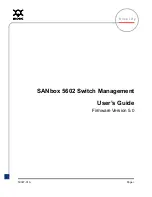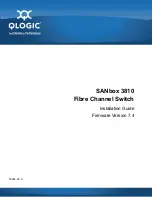
30-50
Catalyst 3560 Switch Software Configuration Guide
78-16156-01
Chapter 30 Configuring IP Unicast Routing
Configuring BGP
Beginning in privileged EXEC mode, follow these steps to determine if a BGP peer supports the route
refresh capability and to reset the BGP session:
Configuring BGP Decision Attributes
When a BGP speaker receives updates from multiple autonomous systems that describe different paths
to the same destination, it must choose the single best path for reaching that destination. When chosen,
the selected path is entered into the BGP routing table and propagated to its neighbors. The decision is
based on the value of attributes that the update contains and other BGP-configurable factors.
When a BGP peer learns two EBGP paths for a prefix from a neighboring AS, it chooses the best path
and inserts that path in the IP routing table. If BGP multipath support is enabled and the EBGP paths are
learned from the same neighboring autonomous systems, instead of a single best path, multiple paths are
installed in the IP routing table. Then, during packet switching, per-packet or per-destination load
balancing is performed among the multiple paths. The maximum-paths router configuration command
controls the number of paths allowed.
These factors summarize the order in which BGP evaluates the attributes for choosing the best path:
1.
If the path specifies a next hop that is inaccessible, drop the update. The BGP next-hop attribute,
automatically determined by the software, is the IP address of the next hop that is going to be used
to reach a destination. For EBGP, this is usually the IP address of the neighbor specified by the
neighbor remote-as router configuration command. You can disable next-hop processing by using
route maps or the neighbor next-hop-self router configuration command.
2.
Prefer the path with the largest weight (a Cisco proprietary parameter). The weight attribute is local
to the router and not propagated in routing updates. By default, the weight attribute is 32768 for
paths that the router originates and zero for other paths. Routes with the largest weight are preferred.
You can use access lists, route maps, or the neighbor weight router configuration command to set
weights.
Command
Purpose
Step 1
show ip bgp neighbors
Display whether a neighbor supports the route refresh capability. When supported,
this message appears for the router:
Received route refresh capability from peer.
Step 2
clear ip bgp {* | address |
peer-group-name}
Reset the routing table on the specified connection.
•
Enter an asterisk (*) to specify that all connections be reset.
•
Enter an IP address to specify the connection to be reset.
•
Enter a peer group name to reset the peer group.
Step 3
clear ip bgp {* | address |
peer-group-name} soft out
(Optional) Perform an outbound soft reset to reset the inbound routing table on the
specified connection. Use this command if route refresh is supported.
•
Enter an asterisk (*) to specify that all connections be reset.
•
Enter an IP address to specify the connection to be reset.
•
Enter a peer group name to reset the peer group.
Step 4
show ip bgp
show ip bgp neighbors
Verify the reset by checking information about the routing table and about BGP
neighbors.
















































